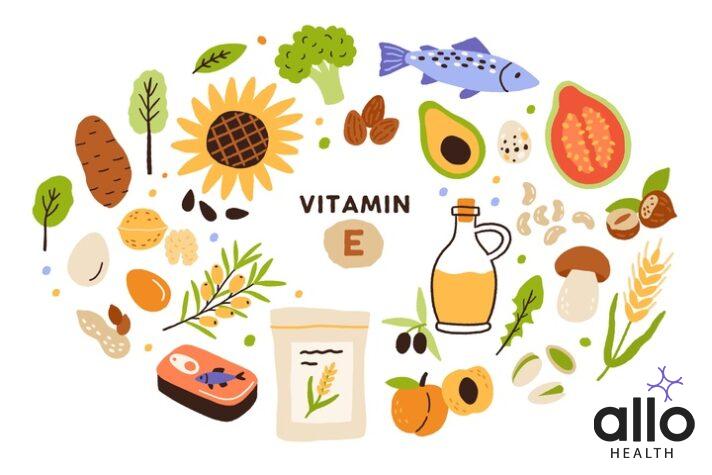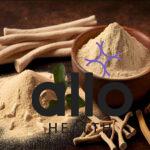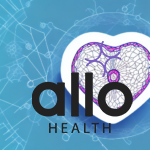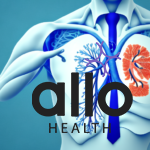Vitamin E: A Link To Sexual And Reproductive Health?

Allo Health is dedicated to personalized well-being, offering support and trusted information tailored to individual health goals. The platform emphasizes human-generated content, led by a distinguished medical team of experts, including physicians and sexual health specialists. Their commitment to credibility involves rigorous fact-checking, authoritative research, and continuous updates to ensure accurate, up-to-date information. Allo Health's unique approach goes beyond conventional platforms, providing expert-led insights and a continuous commitment to excellence, with user feedback playing a crucial role in shaping the platform's authoritative voice.

A psychologist with clinical specialization and experience working with sub-clinical and clinical populations. Her areas of interest and expertise include anxiety-related disorders, mood disorders, psychotic disorders, addictions, sexual health and wellness, relationship issues, stress, and geriatric mental health.
Why This Was Upated?
Our experts continually monitor the health and wellness space, and we update our articles when new information became available.
Updated on 26 December, 2023
- Article was updated as part of our commitment to diversity, equity, and inclusion.

"The following blog article may discuss medical treatments and interventions. However, it is important to note that the information provided is for general educational purposes only and should not be considered as a substitute for professional medical advice, diagnosis, or treatment. Always seek the guidance of a qualified healthcare professional for personalized medical advice.
Book consultation
Medical treatments are complex and should be tailored to individual circumstances. The information presented in this blog may not be applicable to everyone, as each person's medical condition, history, and needs are unique. Only a qualified healthcare professional can evaluate your specific medical situation, consider relevant factors, and provide appropriate recommendations for diagnosis, treatment options, and monitoring.
It is crucial to note that self-diagnosis, self-medication, or relying solely on the information provided in this blog for treatment decisions can have serious health consequences. "
Vitamin E is a powerful antioxidant that plays a crucial role in maintaining a healthy body. In this comprehensive guide, we will explore the numerous benefits of vitamin E intake, the best food sources to incorporate into your diet, and frequently asked questions that address common concerns. Our aim is to provide an engaging and medically accurate resource for those looking to better understand this essential nutrient.
What is Vitamin E?
Vitamin E is a fat-soluble vitamin that acts as an antioxidant, protecting cells from the damaging effects of free radicals. This vitamin is also considered as an antioxidant vitamin supplement.
The term “vitamin E” actually refers to a group of eight chemically distinct compounds, which are divided into two categories: tocopherols and tocotrienols. Each category has four types: alpha, beta, gamma, and delta.
Alpha-tocopherol is the most biologically active form and the most commonly found in supplements.
What are the forms of Vitamin E?
There are eight different forms of this dietary vitamin, which can be divided into two categories: tocopherols and tocotrienols.
The four tocopherols are:
- Alpha-tocopherol
- Beta-tocopherol
- Gamma-tocopherol
- Delta-tocopherol
The four tocotrienols are:
- Alpha-tocotrienol
- Beta-tocotrienol
- Gamma-tocotrienol
- Delta-tocotrienol
Each of these forms has a slightly different chemical structure, with varying degrees of antioxidant activity and biological effects in the body. However, alpha-tocopherol is the most biologically active form of vitamin E and is the form that is most commonly found in supplements and fortified foods.
What is the role of Vitamin E?
- Antioxidant: The vitamin is a powerful antioxidant that helps protect cells from oxidative damage caused by free radicals. This can help prevent or reduce the risk of chronic diseases such as cancer, heart disease, and Alzheimer’s disease.
- Immune function: The vitamin helps support a healthy immune system by enhancing the function of certain immune cells, such as T-cells and B-cells.
- Skin health: The vitamin is often used in skincare products because it helps moisturize and protect the skin from damage caused by UV rays, pollution, and other environmental factors.
- Vision: The vitamin plays a role in maintaining healthy vision by protecting the cells of the eyes from oxidative damage.
- Brain health: Some studies suggest that the vitamin may help reduce the risk of cognitive decline and dementia, although more research is needed in this area.
The Health Benefits: What Disease Does It Protect Against?

Vitamin E has been extensively studied for its health benefits, and the following are some of its potential benefits in detail:
- Protects against oxidative damage: The vitamin is a powerful antioxidant that protects cells and tissues from damage caused by free radicals. Free radicals are unstable molecules that can damage cells and contribute to the development of chronic diseases like cancer, heart disease, and Alzheimer’s disease. Vitamin E neutralizes free radicals by donating an electron, which stabilizes them and prevents them from causing further damage.
- Reduces inflammation: Inflammation is a natural response of the immune system to infection or injury, but chronic inflammation can contribute to the development of chronic diseases. Vitamin E has been shown to have anti-inflammatory effects that can help reduce the risk of chronic diseases. It works by inhibiting the production of inflammatory cytokines and enzymes, reducing the production of reactive oxygen species (ROS) and nitric oxide and modulating the activity of immune cells.
- Promotes heart health: The vitamin has been shown to have protective effects on the heart by reducing the risk of heart disease. It works by reducing oxidative stress, inflammation, and the formation of blood clots. Vitamin E may also help to improve cholesterol levels by reducing the oxidation of LDL cholesterol, which is a risk factor for heart disease.
- May help prevent cancer: The vitamin has been studied for its potential to prevent cancer, although the results are mixed. Some prospective studies have found that vitamin E supplementation can reduce the risk of certain types of cancer, such as prostate and colorectal cancer, while other studies have found no significant effect. Vitamin E may work by reducing oxidative stress, inflammation, and DNA damage, which are all factors that contribute to the development of cancer.
- Supports immune function: The vitamin plays a role in the regulation of immune function by modulating the activity of immune cells. It has been shown to enhance the function of T cells and B cells, which are important components of the immune system. Vitamin E may also help to reduce inflammation and oxidative stress, which can impair immune function.
- Promotes skin health: The vitamin is important for maintaining healthy skin by protecting it from oxidative damage caused by UV radiation and pollution. It works by neutralizing free radicals and reducing inflammation. Vitamin E may also help to improve skin hydration and reduce the appearance of fine lines and wrinkles.
- May improve cognitive function: The vitamin has been studied for its potential to improve cognitive function and reduce the risk of cognitive impairment or decline in older adults. It works by reducing oxidative stress and inflammation in the brain, which can contribute to the development of Alzheimer’s disease and other forms of dementia.
- Supports eye health: The vitamin may also be beneficial for eye health by protecting against oxidative damage and reducing inflammation in the eye. It has been studied for its potential to reduce the risk of age-related macular degeneration, which is a leading cause of blindness in older adults.
- May improve fertility: The vitamin has been shown to have beneficial effects on fertility in individuals. It works by reducing oxidative stress and inflammation in the reproductive system, which can impair fertility. Vitamin E may also improve sperm motility and reduce the risk of miscarriage in women.
- May improve exercise performance: This dietary vitamin may also improve exercise performance by reducing oxidative stress and inflammation in the muscles. It has been studied for its potential to improve endurance and reduce muscle damage and soreness after exercise.
Recommended Daily Intake Of Vitamin E
For males
- Infants (0-6 months): 4 mg/day
- Infants (7-12 months): 5 mg/day
- Children (1-3 years): 6 mg/day
- Children (4-8 years): 7 mg/day
- Boys (9-13 years): 11 mg/day
- Boys (14-18 years): 15 mg/day
- Men (19 years and older): 15 mg/day
For females
- Infants (0-6 months): 4 mg/day
- Infants (7-12 months): 5 mg/day
- Children (1-3 years): 6 mg/day
- Children (4-8 years): 7 mg/day
- Girls (9-13 years): 11 mg/day
- Girls (14-18 years): 15 mg/day
- Women (19 years and older): 15 mg/day
These are general recommendations for daily vitamin intake and may vary depending on an individual’s specific needs and health conditions. It is always recommended to consult a healthcare professional for personalized recommendations.
Top Food Sources
- Almonds: Almonds are a rich source of the vitamin, with just one ounce (28 grams) providing 7.3 mg of vitamin E, which is 49% of the recommended daily Vitamin E intake (RDI). Almonds are also high in healthy fats, fiber, and protein.
- Sunflower seeds: Just one ounce (28 grams) provides 7.4 mg of vitamin E, which is 49% of the RDI. Sunflower seeds are also high in healthy fats, fiber, and protein.
- Wheat germ oil: With one tablespoon (15 ml) providing 20.3 mg of vitamin E, which is 135% of the RDI. However, wheat germ oil is also high in calories and should be used sparingly.
- Hazelnuts: With just one ounce (28 grams) providing 4.3 mg of vitamin E, which is 29% of the RDI. Hazelnuts are also high in healthy fats, fiber, and protein.
- Peanut butter: With just two tablespoons (32 grams) providing 2.9 mg of vitamin E, which is 19% of the RDI. Peanut butter is also high in healthy fats and protein, but be sure to choose a brand that doesn’t contain added sugars or hydrogenated oils.
- Spinach: One cup (30 grams) of cooked spinach provides 1.6 mg of vitamin E, which is 11% of the RDI. Spinach is also high in fiber, iron, and other vitamins and minerals.
- Avocado: With one medium-sized avocado providing 2.7 mg of vitamin E, which is 18% of the RDI. Avocado is also high in healthy fats, fiber, and potassium.
- Broccoli: One cup (91 grams) of cooked broccoli provides 1.2 mg of vitamin E, which is 8% of the RDI. Broccoli is also high in fiber, vitamin C, and other vitamins and minerals.
- Mango: One cup (165 grams) of sliced mango provides 1.0 mg of vitamin E, which is 7% of the RDI. Mango is also high in fiber, vitamin C, and other vitamins and minerals.
- Trout: With one cooked fillet (143 grams) providing 4.2 mg of vitamin E, which is 28% of the RDI. Trout is also high in protein and omega-3 fatty acids.
Other food sources include vegetable oils, such as sunflower oil, safflower oil, and corn oil, as well as fortified breakfast cereals, margarine, and other processed foods. However, it’s important to choose healthy sources of vitamin E that are also low in unhealthy fats, added sugars, and other undesirable ingredients.
Deficiency and Toxicity

Deficiency
Vitamin E deficiency is rare but can occur in people who have diseases that prevent the absorption of fat in the intestines. Some of the symptoms of vitamin E deficiency include:
- Loss of muscle coordination
- Weakness
- Vision problems
- Immune system dysfunction
- Anemia
Toxicity
Toxicity is rare but can occur with high doses of Vitamin E supplements. Vitamin E toxicity can lead to symptoms such as:
- Nausea
- Headache
- Diarrhea
- Stomach cramps
- Fatigue
- Muscle weakness
- Increased bleeding
It is important to speak with a healthcare provider before taking high doses of vitamin E supplements to avoid potential toxicity. The recommended daily allowance (RDA) for vitamin E is 15 mg/day for adults.
What Health Conditions Cause Vitamin E deficiency?
- Malabsorption disorders: These include conditions that affect the absorption of nutrients in the gastrointestinal tract, such as celiac disease, Crohn’s disease, cystic fibrosis, and chronic pancreatitis.
- Liver diseases: Chronic liver diseases such as cirrhosis, hepatitis, and cholestasis can lead to reduced vitamin absorption and storage.
- Genetic disorders: Rare genetic disorders like ataxia with vitamin deficiency (AVED) and abetalipoproteinemia can cause severe vitamin deficiency.
- Low-fat diets: Individuals who consume very low-fat diets or those who are on fat-restricted diets for weight loss or other medical reasons may not get enough vitamin from their diet.
- Premature babies: Premature infants are at risk of vitamin deficiency due to their underdeveloped digestive and liver systems.
- Aging: As people age, their bodies may become less efficient at absorbing and using vitamin, which can lead to deficiency.
- Other medical conditions: Certain medical conditions like cystic fibrosis, pancreatic insufficiency, and biliary atresia can also increase the risk of vitamin deficiency.
Deficiency Increases The Risk For Health Conditions
- Neurological disorders: The deficiency can cause nerve damage, leading to symptoms such as muscle weakness, difficulty walking, loss of balance, and vision problems.
- Cardiovascular disease: The vitamin helps to prevent the oxidation of LDL cholesterol, which can lead to the buildup of plaque in the arteries and increase the risk of heart disease or cardiovascular events.
- Risk Of Cancer: Some studies have suggested that the vitamin may help to protect against certain types of cancer, including:
- prostate cancer
- breast cancer
- lung cancer
- Cognitive impairment or cognitive decline: This vitamin may play a role in preventing cognitive impairment and decline and dementia, including Alzheimer’s disease.
- Eye disorders: Vitamin E is essential for maintaining eye health, and a deficiency can increase the risk of age-related macular degeneration and other eye disorders.
Treatment For Deficiency
- Increase dietary intake: Foods that are high in the vitamin include nuts, seeds, vegetable oils, and leafy green vegetables. Adding these foods to your diet can help increase your vitamin intake.
- Take supplements: Dietary Supplements are available in various forms, such as capsules, tablets, and liquids. These supplements can provide a higher concentration of the vitamin than what is available in food.
- Topical application: In some cases, topical application of vitamin E may be recommended to treat specific conditions, such as skin issues or scars.
Supplementation
Supplementation of this dietary antioxidant may be beneficial for certain individuals, including those with malabsorption disorders, pregnant and breastfeeding women, and people with specific genetic conditions. However, it is always best to consult a healthcare professional before starting any supplement regimen.
When choosing a dietary supplement, look for natural forms, such as d-alpha-tocopherol, which are more easily absorbed by the body. Additionally, consider choosing a mixed tocopherol supplement, as this provides a more comprehensive range of vitamin E compounds.
Vitamin E & Sexual And Reproductive Health
Sexual and reproductive health refers to the well-being of the reproductive system and its functions. This includes the ability to have healthy sexual relationships, the ability to conceive and carry a healthy pregnancy, and the prevention and treatment of sexually transmitted infections (STIs). Sexual and reproductive health is essential for overall health and well-being.
There is some evidence to suggest that Vitamin E may have a link to sexual and reproductive health. Let’s take a closer look at some of the studies that have investigated this link.
Vitamin E and Male Fertility
One prospective study found that men who had more Vitamin E levels had higher sperm counts and better sperm motility than men who consumed less Vitamin E. Another study found that Vitamin E supplementation improved sperm motility and increased the chances of conception in men with infertility.
The exact mechanisms by which Vitamin E improves male fertility are not yet fully understood. However, it is believed that Vitamin E may protect sperm from oxidative damage, which can reduce their quality and motility.
Vitamin E and Female Fertility
The link between Vitamin E levels and female fertility is less well-established than the link between Vitamin E and male fertility. However, there is some evidence to suggest that the vitamin may play a role in female fertility.
One study found that women who took a Vitamin E supplement had a higher chance of becoming pregnant through assisted reproductive technologies (ART). Another study found that Vitamin E supplementation improved the quality of eggs in women undergoing in vitro fertilization (IVF).
The exact mechanisms by which the vitamin improves female fertility are not yet fully understood. However, it is believed that Vitamin E may improve the quality of eggs and protect them from oxidative damage.
Vitamin E and Sexual Function
One study found that Vitamin E supplementation improved sexual function in men with erectile dysfunction. Another study found that Vitamin E improved sexual function in men undergoing treatment for prostate cancer.
The exact mechanisms are not yet fully understood. However, it is believed that Vitamin E may improve blood flow to the penis, which can improve erectile function.
Final Words
Vitamin E is a vital nutrient with numerous health benefits, including its antioxidant properties, heart health support, and potential roles in skin and eye health. Incorporating vitamin E-rich foods into your diet is an excellent way to ensure you meet your daily requirements. If you’re considering supplementation, it’s important to consult a healthcare professional to determine the appropriate dosage and form of vitamin E for your specific needs. By understanding the ins and outs of this essential nutrient, you can make informed decisions about your health and well-being.
Frequently Asked Questions
Q: Can vitamin E help with scars?
A: While vitamin E is often touted as a remedy for scars, scientific evidence remains inconclusive. Some studies suggest that topical application of vitamin E may improve the appearance of scars, while others show no significant improvement or even worsening of the scar. It is best to consult a dermatologist for personalized advice on scar treatment.
Q: Are vitamin E supplements safe for everyone?
A: Vitamin E supplements are generally safe for most people. However, individuals with specific health conditions, such as blood clotting disorders or those taking anticoagulant medications, should consult their healthcare provider before using vitamin E supplements, as high doses may increase the risk of bleeding.
Q: Can vitamin E help with hair growth?
A: While there is no direct evidence to support the claim that vitamin E promotes hair growth, its antioxidant properties may help protect hair follicles from damage caused by free radicals, thus potentially promoting healthier hair.
Q: How long does it take for vitamin E to work on the skin?
A: The benefits of vitamin E for skin health may take time to become apparent. Consistent use of vitamin E-containing skincare products, along with a balanced diet rich in vitamin E, is more likely to yield positive results over time.
Q: Can I get too much vitamin E from food?
A: It is highly unlikely to consume toxic levels of vitamin E through diet alone, as most natural food sources do not contain excessive amounts of the nutrient. Toxicity is generally associated with overconsumption of vitamin E supplements.
Q: Does vitamin E reduce risk of cancer?
A: There is limited evidence to suggest that vitamin E reduces the risk of cancer, and more research is needed to establish a definitive link. But some studies have shown potential benefits against cardiovascular risks, while others have not found a significant protective effect. But, this dietary vitamin
Q: Can I consume vitamin E for sexuality?
A: There is no strong scientific evidence to support vitamin E intake specifically for enhancing sexuality or sexual performance. A balanced diet, exercise, and overall health are more critical factors for maintaining sexual health.







































